Our daily need for vitamins is not great, but vitamins play a key role in the vitality of the body and from a medical point of view have a very special place in human health.
Vitamins are very diverse, even listing all of them takes a long time.
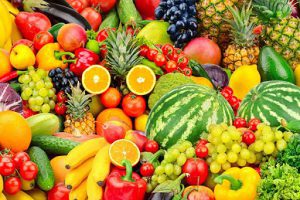
Among these many, there are a few who are both of special importance and are well-known and well-known, and more than any of their peers, they have fallen on deaf ears.
Vitamin A
Vitamin A is a fat-soluble vitamin that is found naturally in many foods.
Vitamin A plays an important role in the natural vision of the eyes, the immune system and also reproduction.
It also helps the heart, lungs, kidneys and other organs to do its job properly.
There are two different types of vitamin A; Type 1: Vitamin A, which is readily available for absorption in red meat, poultry, fish and dairy products.
The second type is called provitamin A and is found in fruits, vegetables and plant products. The second most common type of vitamin A is found in beta-carotene foods and supplements.
Natural sources of vitamin A:
Beef liver and red meat (Warning: These foods are high in cholesterol, so we should not overdo them.)
Some types of fish, such as salmon.
Green leafy vegetables and yellow, orange and green vegetables such as broccoli,
Carrots and squash
Fruits such as cantaloupe, apricot and mango.
Dairy products.
Who is most at risk for vitamin A deficiency?
Premature babies who often get little vitamin A during the first year of life.
Infants, young children, pregnant and lactating mothers, of course in developing countries
People with cystic fibrosis
Complications of vitamin A deficiency:
Vitamin A deficiency is common in many developing countries. The most common complication of vitamin A deficiency in young children and pregnant women is a type of low light vision, which can lead to blindness if left untreated.
Some effects of vitamin A on human health
The following shows some of the effects of vitamin A on human health.
Cancer: People who consume “natural foods” containing beta-carotene are less likely to be at risk for certain types of cancer, such as lung cancer or prostate cancer, but studies so far have not shown that beta-carotene or vitamin A supplements can cure cancer. Prevent or reduce the risk of dying from cancer. In fact, studies show that smokers who take large amounts of beta-carotene supplements are at increased risk for lung cancer.
Measles: Measles is more dangerous for children with vitamin A deficiency. In these children, supplements containing large amounts of vitamin A can reduce the fever and diarrhea caused by measles. These supplements can also reduce the risk of death for children with vitamin A deficiency and measles at the same time in developing countries where vitamin A deficiency is common.
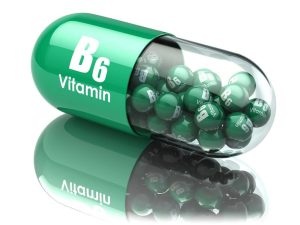
Vitamin B6
Vitamin B6 is naturally present in many foods. The human body uses this vitamin for more than one hundred enzymatic reactions in the metabolic process.
This vitamin is also involved in brain formation and development as well as immune function during pregnancy and infancy.
Natural sources of vitamin B6
Because this vitamin is naturally present in many foods, the following foods can meet the body’s needs:
Poultry, fish, and internal organs of animals such as liver, heart, offal, and so on, are all rich in vitamin B6.
Potatoes and other starchy products are one of the most important sources of this vitamin.
Fruits, except citrus, are also one of the most important sources of vitamin B6.
Who is at risk for vitamin B6 deficiency?
The following people are more likely to be deficient in vitamin B6:
People whose kidneys are not working properly, including people who need dialysis and people who have a transplanted kidney.
People with autoimmune disorders that cause the immune system to malfunction and attack healthy tissues in the body. For example, people with rheumatoid arthritis sometimes suffer from vitamin B6 deficiency.
Complications of vitamin B6 deficiency
People with a deficiency of this vitamin may experience a range of complications, including anemia, itchy skin, dry lips, cracks in the corner of the mouth, and swelling of the tongue.
Other symptoms of low B6 include depression, confusion, and a weakened immune system. Young children who do not get enough B6 may become moody and irritable, or develop epilepsy.
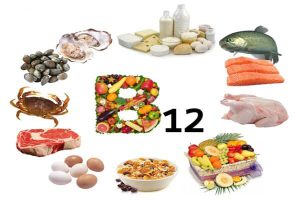
Vitamin B12
Vitamin B12 keeps nerve cells and blood cells healthy and helps build DNA in all cells in the body.
It also prevents anemia that causes fatigue and weakness.
It takes two steps for our body to get vitamin B12 from food. The first step is to separate the hydrochloric acid in the stomach of vitamin B12 from the proteins to which it is attached.
This vitamin then combines with the protein produced in the stomach and is absorbed by the body. Some people who are unable to produce this protein have difficulty getting vitamin B12 from all foods and supplements.
Natural sources of vitamin B12
This vitamin is found naturally in a wide variety of animal foods. Plant foods do not contain vitamin B12 unless they are fortified with it in the food industry.
The following natural foods contain this vitamin, which is also one of the most important natural sources, and by consuming them, the body’s needs in this field can be met:
Beef liver and oysters are the best source of vitamin B12.
Fish, red meat, poultry, eggs, milk and other dairy products.
Who is most at risk for vitamin B12 deficiency?
In general, people who do not consume enough animal products are at risk for vitamin B12 deficiency.
In addition, some people have difficulty getting this vitamin:
Many older people, who do not have enough hydrochloric acid in their stomachs, cannot absorb the natural vitamin B12 in their diet. People over the age of 50 should get the most vitamin B12 they need through fortified foods or supplements. Take it orally (as prescribed by your doctor) because most people over the age of 50 can get vitamin B12 from such sources.
People who have had surgery on their stomach and intestines, such as weight loss surgery or people with certain digestive disorders, have difficulty getting this vitamin.
People who do not consume or consume very little animal products deprive themselves of vitamin B12. Because this vitamin is naturally present only in animal foods.
This is especially important for pregnant and lactating mothers because not getting enough of this vitamin can even cause a deficiency in their baby.
Complications of vitamin B12 deficiency
Deficiency of this vitamin causes fatigue, weakness, constipation, loss of appetite, weight loss and some types of anemia.
It can also cause nerve problems, such as falling asleep or tingling in the hands and feet. Difficulty maintaining balance, depression, confusion, dementia and poor memory can also be consequences. Deficiency of this vitamin can also damage the nervous system of people who do not have anemia, so it must be treated as soon as possible.

Vitamin C
Vitamin C, also known as ascorbic acid, is a water-soluble food and is found in some foods.
This vitamin plays an antioxidant role in the human body, helping to protect cells from free radical damage.
Free radicals are compounds that our bodies make when we convert food into energy. Environmental factors such as cigarette smoke, air pollution and the sun’s ultraviolet rays can also expose people to free radicals.
The human body needs protein to heal wounds and injuries, which it must produce with the help of vitamin C.
In addition, it facilitates the absorption of iron from plant foods and helps the immune system to do its job properly.
Natural sources of vitamin C.
Fruits and vegetables are the best source of vitamin C. By consuming the following foods, you can meet your body’s need for this vitamin:
Citrus fruits such as oranges and grapefruits, as well as their juices, green peppers and kiwis, are high in vitamin C.
Other fruits and vegetables such as broccoli, strawberries, cantaloupe, baked potatoes and tomatoes.
Note that the amount of vitamin C in food may be reduced due to long-term storage of food as well as in the cooking process.
Steaming or cooking food in the microwave is better than any other cooking method for preserving vitamin C.
Fortunately, many foods that are a source of vitamin C, such as fruits and vegetables, are usually eaten raw and do not need to be cooked.
Complications of vitamin C deficiency
People who do not take vitamin C for a few weeks or take less than the required amount of less than 10 mg per day are more likely to develop scurvy.
The disease causes fatigue, gingivitis, small red and purple spots on the skin, joint pain, prolonged wound healing, and curly hair.
Other symptoms of scurvy include depression, swelling and bleeding gums, and loose and even loose teeth.
People with scurvy may even have anemia. Deadly if scurvy is not treated
will be.
Some effects of vitamin C on human health
Cancer: People who eat a lot of fruits and vegetables and thus get large amounts of vitamin C are less likely to develop many types of cancer, such as lung, breast and colon cancers. However, taking oral vitamin C supplements, such as effervescent pills that children are very interested in, with or without other antioxidants, apparently can not prevent cancer.
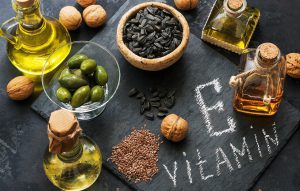
Natural sources of vitamin E
Vitamin E is found naturally in many foods. By eating the following foods you can get the necessary amount of vitamin E in your body:
Vegetable oils such as wheat germ oil, sunflower oil, safflower seed oil are among the best sources of vitamin E. Corn oil and soybean oil can also provide some of the vitamin E your body needs.
Plant kernels, such as peanuts, hazelnuts, and especially almonds, as well as seeds such as sunflower seeds are among the best sources of vitamin E. Of course, the raw nature of all these snacks is much more than their roasted nature. Roasting and salting may destroy the properties of these snacks in many cases.
Green vegetables such as spinach and broccoli contain some vitamin E.
Who is most at risk for vitamin E deficiency?
In general, healthy people rarely show clear signs of vitamin E deficiency. Read more in this regard.
Complications of vitamin E deficiency
Vitamin E deficiency is rare in healthy people. The vast majority of people who are deficient in vitamin E actually have difficulty digesting and absorbing fat because the digestive system needs some fat to absorb vitamin E.
Vitamin E deficiency can lead to muscle and nerve damage, which in turn can lead to numbness in the arms and legs, inability to control movement, muscle weakness, and vision problems. Another sign of a deficiency in this vitamin is a weakened immune system.
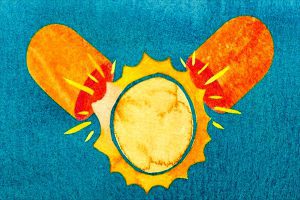
Vitamin D
Vitamin D is found in some foods that are needed to keep bones healthy and strong.
In fact, vitamin D helps keep bones healthy and strong by helping them absorb calcium from foods and supplements, because calcium is one of the main building blocks of bones.
The bones of people who receive very little vitamin D may become soft, thin and brittle.
This complication is known as “rickets (or osteoporosis)” in children and “osteoporosis” in adults. However, vitamin D is very important for the body for other reasons.
For example, muscles need vitamin D to move, nerve cells to transmit messages between the brain and all parts of the body, and the immune system to fight off viruses and invading bacteria.
In addition, vitamin D along with calcium can protect the elderly against osteoporosis. Vitamin D is found in cells throughout the body.
Natural sources of vitamin D.
Very few foods naturally contain vitamin D:
Fatty fish such as salmon and any other fatty fish.
Beef liver, cheese and egg yolks, which contain small amounts of vitamin D.
Mushrooms have a small amount of vitamin D.
sun
When our skin is exposed to direct sunlight, our bodies make vitamin D. Most people get at least some of the vitamin D they need this way, but there is a very important point in this method: the skin must be exposed to direct sunlight and the sun in any other way. Even shining through the window glass on the skin can not cause the body to produce vitamin D. Clouds, shadows and, of course, dark skin are all factors that reduce the production of vitamin D in the sun.
However, despite the importance of the sun for the production of vitamin D in the body, one should be careful about its destructive and carcinogenic effects, because negligence will increase the risk of skin cancer.
Who is most at risk for vitamin D deficiency?
Infants, because human milk is not a good source of vitamin D. You should consult your doctor to compensate for this vitamin for infants.
The elderly, because their skin exposed to the sun can not make vitamin D like in their youth, and their kidneys do not have much power to convert vitamin D to its active form.
People with dark skin, because their skin can produce less vitamin D in the sun.
Obese people, because their body fat traps some vitamin D and prevents it from entering the bloodstream.
Complications of vitamin D deficiency
People cannot get enough vitamin D for three main reasons. First, insufficient sun due to climatic, occupational or cultural constraints.
Second, poor diet and third, the inability of the kidneys to activate vitamin D in the body. Vitamin D deficiency in children causes rickets in which the bones become soft and bent.
Although the disease is rare, it still occurs in some areas. In adults who are deficient in this vitamin, osteoporosis develops, which causes bone pain and muscle weakness.
Medical site and health magazine im healthiest
